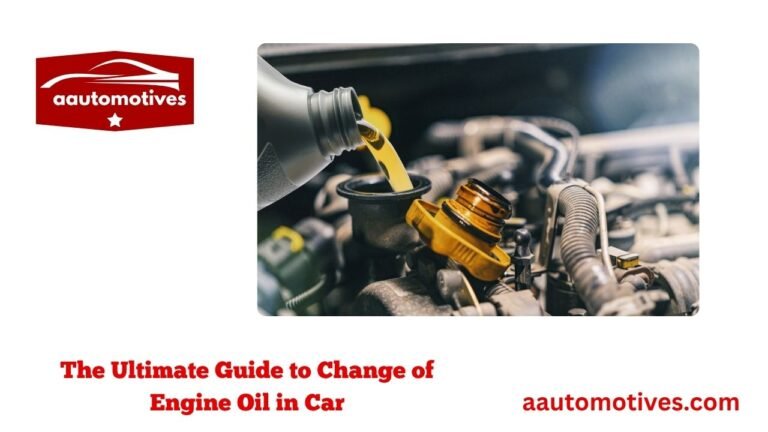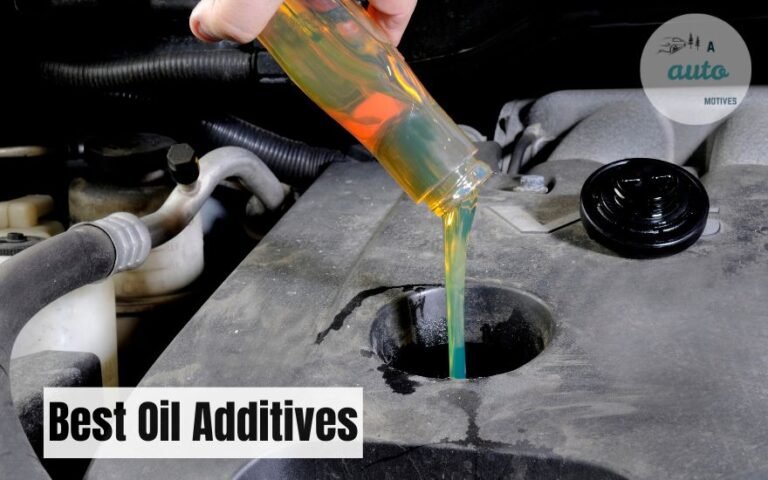What Happens If You Don’t Change Oil in Your Car

Let’s be honest. We’ve all looked at that little sticker on the windshield and thought, “Eh, I can stretch it a bit longer.” Life gets busy, money gets tight, and before you know it, it’s been 7,000 miles since your last oil change. Sound familiar?
But what actually happens if you keep pushing it? What if your car could talk—would it scream, cry, or just silently die? Understanding what happens if you don’t change oil in your car is not just for gearheads. It’s for anyone who wants to avoid turning a $50 oil change into a $5,000 engine replacement.
This article will walk you through everything—from the first signs of trouble to the worst-case scenario. And trust me, you don’t want to end up in the worst-case scenario.
Why Engine Oil Is the Lifeblood of Your Car

Engine oil serves three key purposes:
-
Lubricates moving parts to reduce friction
-
Cools the engine by absorbing and dispersing heat
-
Cleans by carrying away dirt, metal particles, and debris
When you don’t change your oil, it gets thick and dirty. Over time, it loses all its magic. And when that happens, your engine suffers—quietly at first, then catastrophically.
The First Sign: Oil Turns Into Sludge
Imagine pouring syrup into your engine instead of oil. That’s what neglected oil eventually becomes—black, gooey sludge.
Sludge doesn’t flow properly. It sticks to engine parts, especially tight spaces like valve lifters and camshafts. It’s like trying to breathe through a clogged straw.
Why It Matters:
-
Poor flow means poor lubrication.
-
Your engine runs hotter.
-
Moving parts start to grind instead of glide.
And here’s the thing—you won’t notice it at first. No lights on the dash, no loud noises. But beneath the hood, damage is building.
Internal Wear Increases Rapidly
Friction is the enemy of every engine. That smooth hum you hear when you drive? It’s your engine working like a well-oiled machine—literally.
But when that oil breaks down or disappears altogether, metal grinds against metal. And nothing good ever comes from that.
What’s Really Happening:
-
Bearings start wearing out
-
Pistons get scratched
-
Cylinder walls degrade
-
Timing chain gets extra stress
This wear is irreversible. Once those parts wear down, there’s no going back without major repairs. And here’s the kicker—you’ll still think your car’s “fine.”
Overheating Becomes Your New Normal
Engines generate heat—a lot of it. The only reason they don’t melt is because oil helps carry that heat away. When oil’s old or absent, that cooling system collapses.
Suddenly, you notice your car running hot. Maybe the temperature gauge creeps up. Maybe you see steam coming from under the hood.
Here’s What Might Happen:
| Oil Status | Engine Temperature | Risk Level |
|---|---|---|
| Fresh oil | Normal | Low |
| 5,000 miles overdue | Mildly elevated | Medium |
| 10,000+ miles | Overheating | High |
| Sludge in engine | Constant overheating | Critical |
And let’s be real—overheating isn’t just an inconvenience. It’s a clear sign your engine is being damaged every second it’s running.
Fuel Economy Takes a Nosedive
Ever feel like you’re filling up the tank more often than usual? That might not be in your head.
Dirty oil forces your engine to work harder. That’s more fuel burned for the same performance.
You Might Notice:
-
More frequent trips to the gas station
-
Less pep when accelerating
-
Engine noise sounding “strained”
It’s like running in sand. You burn more energy (or gas) just to keep going. And with fuel prices the way they are? Ouch.
Your Engine’s Lifespan Gets Cut Short
One of the most expensive mistakes drivers make is assuming engines are indestructible. Spoiler: They’re not.
The average engine can easily last 200,000 miles or more—with regular oil changes. Skip them, and you could be staring down an engine failure before 100,000 miles.
So what happens if you don’t change oil in your car long-term? You age your engine by thousands of miles every time you delay.
This isn’t scare talk—it’s the reality experienced by thousands of drivers who ignored their oil changes “just this once.”
Warning Lights Start Popping Up
Eventually, your car tries to talk back. It starts with that yellow oil pressure light. Then maybe a “Check Engine” light joins the party.
But here’s where it gets tricky. By the time these lights appear, the damage might already be done.
Common Warning Signs:
-
Oil pressure warning
-
Check engine light
-
Strange engine noises
-
Burning oil smell
-
Engine knocking
Your car’s not trying to annoy you—it’s begging you to save its life. Listen.
Engine Knocking and Permanent Damage
Imagine tiny hammers banging inside your engine. That’s engine knocking—a loud, metallic sound caused by worn-out or unlubricated components.
It often means oil is no longer reaching key parts. Sometimes it’s due to low levels. Other times, it’s because the oil is so dirty it can’t flow.
If this happens, stop driving immediately. The longer you keep going, the closer you get to full engine failure.
And once that happens? You’re not changing your oil—you’re changing your entire engine.
Real Talk: The Cost of Avoiding Oil Changes
Let’s do a quick breakdown of what ignoring oil changes might cost you:
| Maintenance Choice | Cost Range | Frequency |
|---|---|---|
| Regular Oil Change | $40 – $100 | Every 5,000 miles |
| Sludge Cleaning (Flush) | $150 – $300 | As needed |
| Timing Chain Replacement | $1,000 – $2,500 | Once per engine life |
| Full Engine Replacement | $4,000 – $7,000 | Worst case |
Is saving $50 worth risking a $5,000 repair? Probably not.
Preventing the Damage: The Smart Way to Handle Oil Changes
Here’s the good news: everything we’ve talked about so far? It’s completely avoidable. You don’t need to be a mechanic or have a fancy garage. Preventing engine damage from skipped oil changes is easier than most people think.
Practical Tips:
-
Stick to your owner’s manual. If it says 5,000 miles or 6 months, follow it.
-
Use reminders. Set a calendar alert on your phone.
-
Check your oil every month. It takes two minutes with a paper towel.
-
Listen to your car. If something sounds off or feels sluggish, it’s not just your imagination.
-
Choose the right oil. Not all oils are the same (we’ll get to that next).
A little attention every few months can add years to your engine’s life. Think of oil changes like brushing your teeth. Skip them, and decay sets in—fast.
Choosing the Right Type of Oil for Your Car
One size doesn’t fit all. Just like you wouldn’t wear flip-flops to a snowstorm, your car needs the right oil for the conditions it drives in.
Here’s a simple breakdown:
| Oil Type | Best For | Change Interval |
|---|---|---|
| Conventional Oil | Older engines, low-mileage cars | 3,000–5,000 miles |
| Synthetic Blend | Moderate driving, budget-conscious | 5,000–7,500 miles |
| Full Synthetic | High-performance, modern engines | 7,500–10,000+ miles |
| High-Mileage Oil | Cars over 75,000 miles | 4,000–7,000 miles |
Full synthetic oils cost more upfront but offer better protection, especially in extreme temperatures. If your car’s newer, this is usually what your mechanic recommends.
Still unsure? Your owner’s manual or dealership can give you the exact specs.
DIY vs. Mechanic: Which Is Better?
There’s something satisfying about changing your own oil. You get your hands dirty, save a few bucks, and feel like you’ve accomplished something real.
But it’s not for everyone.
DIY Pros:
-
Saves money
-
Learn more about your car
-
Quick for experienced folks
DIY Cons:
-
Can get messy
-
Requires tools and space
-
Easy to miss small mistakes (like wrong filter or loose plug)
Mechanic Pros:
-
Done professionally
-
Multi-point inspections often included
-
Usually faster and cleaner
For most people, getting it done at a shop is the simplest route. But if you like wrenching on weekends? More power to you.
Just don’t skip it, whichever way you go.
Common Myths About Oil Changes
There’s a lot of misinformation floating around when it comes to oil. Let’s clear up a few of the most common myths.
Myth 1: “You don’t need to change oil if you don’t drive much.”
Even if you barely drive, oil degrades over time. Moisture and oxidation can cause oil to break down after 6–12 months.
Myth 2: “If the oil looks clean, it’s fine.”
Clean doesn’t mean effective. Oil can still lose its protective qualities even if it looks okay.
Myth 3: “Synthetic oil lasts forever.”
It lasts longer, but not forever. It still needs regular changes—just at wider intervals.
Myth 4: “You can use any oil.”
Wrong oil = wrong viscosity = poor lubrication. Always check your manufacturer’s recommendations.
Falling for these myths is one way people end up learning the hard way what happens if you don’t change oil in your car.
How Neglected Oil Affects Resale Value
Thinking of selling your car one day? Then keep those oil changes up to date.
Buyers (and dealers) always check service records. A history of skipped oil changes is a red flag. It can lower your resale value by hundreds or even thousands.
Worse, hidden engine damage might show up during a test drive or inspection. That can ruin a sale—or lead to costly repairs before you can even list the car.
Pro tip: Save your receipts or use an app to log every oil change. A well-documented car history = better price, faster sale.
FAQs About Not Changing Your Oil
1. How long can you go without changing oil?
You might get away with 7,000 miles, maybe even 10,000 if you’re lucky. But you’re playing with fire. Once oil degrades, damage starts.
2. Can old oil cause engine failure?
Yes. Over time, degraded oil can cause overheating, wear, and internal damage that leads to total failure.
3. What does bad oil look like?
It’s dark, gritty, and sludgy. If it looks more like molasses than honey, it’s overdue.
4. What happens if oil is never changed?
Engine failure. Eventually, the engine will seize or break down beyond repair.
5. Can changing oil too late still save the engine?
Maybe—if no major damage has occurred. But it’s like putting a Band-Aid on a broken leg.
6. How do I know if my oil is too old?
Check color and texture. Gritty, dark oil is a sign it’s time. If it’s been 6+ months, change it.
7. What oil should I use for winter driving?
Full synthetic with lower viscosity (like 5W-30) is best for cold starts and protection in freezing temps.
8. How much is too much oil between changes?
Burning more than 1 quart every 1,000 miles is concerning. It may signal leaks or internal wear.
9. What if I only drive short trips?
Short trips can be harder on oil due to incomplete engine warmups. You may need more frequent changes.
10. Can I switch between oil types?
Yes, but make sure it meets your vehicle’s specs. Don’t mix types—completely drain old oil first.
Final Thoughts: Don’t Let a Small Habit Become a Big Problem
Look, we get it. Life is hectic. It’s easy to let small things like oil changes fall off the to-do list. But this one habit—just one—has massive consequences if ignored.
So, what happens if you don’t change oil in your car?
-
Your engine wears down
-
You lose fuel efficiency
-
Sludge builds up
-
You risk total engine failure
-
You spend way more in repairs
But when you keep up with oil changes, your car rewards you with longer life, smoother drives, better fuel economy, and peace of mind.
It’s like giving your car a fresh breath of air. Regular oil changes aren’t just maintenance—they’re care. And your car, your wallet, and your future self will thank you for it.






